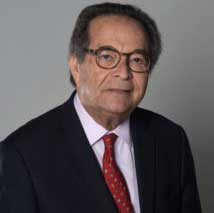An “independence” between letters

By: Luis Beltrán Guerra G. - 14/07/2025
Share:
We hear that “the independence of countries” has not ceased to be “a tendency” both in the economic context, where “interdependence” reigns, and in the political context, with respect to which we read that it was, is and continues to be “a desire bequeathed by “the Enlightenment”, a movement that, by freeing us from colonialism, would lead to the “happiness of man”.
For philosophy, one is “independent when we do not obtain in order to “be such”, the action of another” (a man or a State are called such to the extent that their life or their conduct do not depend on that of another man or State. “A fact is independent of another to the extent that it is not in the hands of the former”. And any proposition is independent of another or of a system of propositions if one is not deducible from the other (Giovanni Fornero, Dictionary of Philosophy, 2004).
History, as is notoriously propagated, reveals that "power" (some even attribute to it an "original character"), on which everything depends, is decisive, in reality, between the power relations that typify social classes and the State. Power is also observed in the various sectors of society, beginning with the daily relationships between citizens themselves. It is perceived as a long process, always open and never concluded. "Independence" must be conceptualized, in today's human context, as "a consequence" of the struggles between "powerful politicians, intellectuals, scientists, and geniuses" versus "the poor" (needy, indigent, needy, unprotected, helpless, and in some cases, miserable or beggarly). Also, with something scarce or of low quality, insufficient, lacking, or humble. Independence, in politics, is associated with "sovereignty," and can therefore It can be described as the external aspect of the former. It is noted, however, that the former should be interpreted, in the real context, as "relative," since it postulates an equally relative and even theoretical value, since in reality "the imperialist and hegemonic imposition of economically and militarily strong states subject others to various forms of political obedience" (Borja, Encyclopedia, 1997).
It is in this unquestionable reality that "independence and the sovereignty it entails" are most clearly perceived, with the peremptory need for formally and substantially serious measures, well studied and evaluated, as a path to the seriousness they demand. This is the meaning of this essay, particularly with regard to "the building of republics," and even more so when they are structured as democratic, since they require "a hierarchy of ideals and a high dose of courage." The opposite, as usual and although surprising, is more common, current, and ordinary. Not all of us can be heads of state, senators, representatives, and judges. The prominent Venezuelan Marco Tulio Brunicelli (RIP) left us the lapidary phrase, "Governing is serious business," praised by Don Rómulo Betancourt, one of our leaders and a constitutional and democratic president, convinced that to govern, legislate, and decide according to the law, not only intersubjective conflicts, but also those of "male gonads," are crucial: preparation, work capacity, and honesty. Quite the opposite characterizes, with few exceptions, the so-called "paper democracies" in Latin America today. The regimes that must exist demand serious efforts, which cannot be contained in simple "letters" or their equivalents. Some are sent by liberators and their collaborators, and others by prominent figures who admire the libertarian exploits. But, more seriously, they are sent by alleged collaborators and apparently in good faith. Ultimately, the opposite occurs, in most cases: "bad faith and even deceit."
The Spanish professor Luis Sánchez Agesta believes that power is an energy projected into social life, given the obedience we provide, and that it responds to persuasion, fear, or the acceptance of a higher hierarchy. He also refers to "the organization of material force," as well as to "spiritual aspects," which are determinants both in "social life and in the behavior of other men," and in this regard, even proposes "a political reorganization of humanity." The academic reiterates that it is "an energy" because the will of those who wield power is decisive in the behavior of others, the basis of which is the power's capacity for persuasion or coercion and the rationality and psychological motivations that drive obedience. Finally, the professor points out that power is also beneficial in that it arbitrates potential disputes and guarantees peace.
It is well known that in 1492, Christopher Columbus, convinced of a western route to India and China, ended up landing in the Bahamas, initiating what became known as the Spanish Empire, a misconception from which "Latin Americanism" eventually emerged, liberated quite some time later toward independence, theoretically with a sovereign substratum. The Venezuelan Simon Bolívar was the author of the feat of independence of a continent still today in search of political stability and economic prosperity. Everything has been done, but little has been fruitful. Independence and sovereignty within it incite crumpled among papers.
They are described as constitutions at the mercy of whoever writes them, directly or indirectly. South America is viewed with distrust by established countries. We are perceived as on the tortuous path to becoming true, respected, and socially oriented democracies. And with little hope.
Perhaps we have set out to achieve such praiseworthy, yet difficult, goals through letters, like the lovers of yesteryear. In the book "José Antonio Páez, Founder of the Republic," by jurist and friend Dr. Tomas Polanco, whose children I was fortunate enough to have as disciples, there is evidence of the use of letters between the Liberator and Páez, a path to his assuming the Presidency of the then-republic.
God grant that the reader may share this opinion.
And I agree, as already expressed, that "by freeing ourselves from colonialism we would find the path to the "happiness of man."
«The opinions published herein are the sole responsibility of its author».